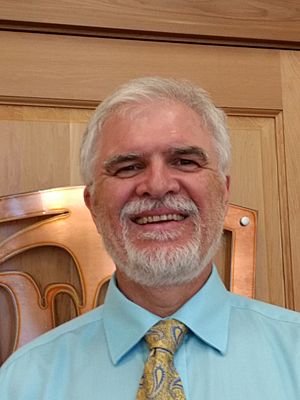Jack Woodward facts for kids
Quick facts for kids
Jack Woodward
|
|
|---|---|

Woodward in 2018
|
|
| Born | 3 October 1951 New Westminster, British Columbia, Canada
|
| Alma mater |
|
| Occupation | Lawyer |
| Political party | New Democratic Party |
Jack Woodward (born in 1951) is a Canadian lawyer. He specializes in Aboriginal law, which deals with the rights of Indigenous peoples in Canada. He wrote a very important book called Aboriginal Law in Canada. This book is seen as the best guide on Aboriginal law in Canada.
In 2022, a magazine called Maclean's named him one of the top 50 most influential Canadians. These are people who are making a big difference in how Canadians think and live.
Woodward has worked as a lawyer since 1979. He mostly focuses on Aboriginal law and environmental law. He has helped over one hundred First Nations groups. He worked on many important legal cases, including the famous Tsilhqot'in Nation v British Columbia case. This was the first time a court officially recognized Aboriginal title over land in Canada.
Contents
Jack Woodward's Early Career and Impact
Jack Woodward has made a big difference in Canadian law. He helped shape important parts of the Canadian Constitution. He also taught law and helped create new courses.
Drafting Section 35 of the Constitution
In 1981, Jack Woodward wrote the first draft of Section 35 of the Constitution Act, 1982. This part of the Constitution is very important. It protects the Indigenous and treaty rights of Indigenous peoples in Canada.
Ian Waddell, a politician, wrote in his book that Woodward drafted this section. He did this during talks in Ottawa with the Minister of Justice, Jean Chrétien. This event is also mentioned in another book called Box of Treasures or Empty Box?
Starting a Law Firm and Teaching
In 1988, Jack Woodward started his own law firm, Woodward and Company. He also taught law at the University of Victoria for 16 years. He helped create the university's first course focused on Aboriginal law.
In 2011, Woodward was given the title of Queen's Counsel (KC) in British Columbia. This is a special honour for experienced lawyers.
Important Legal Cases
Jack Woodward has been involved in several landmark cases. These cases have helped define Aboriginal rights in Canada.
MacMillan Bloedel Ltd. v Mullin, 1985
This case involved the Nuu-chah-nulth First Nation and logging on Meares Island in British Columbia. In 1984, members of the Nuu-chah-nulth First Nation and other people protested. They blocked a logging company called MacMillan Bloedel from cutting down trees.
The province of British Columbia said the land belonged to the government. But the protesters said logging would harm their Aboriginal title to the land. A court order was requested to stop the logging. The case was put on hold by agreement between the First Nation, the company, and the governments. The logging is still stopped on Meares Island today.
Tsilhqot’in Nation v. British Columbia, 2014
The Tsilhqot’in Nation v. British Columbia case is a very important decision by the Supreme Court of Canada. It was the first time a court officially recognized Aboriginal title over a large area of land.
The case started in 1983 when the province allowed a company to log in an area claimed by the Xeni Gwet'in band of the Tsilhqot'in Nation. The Xeni Gwet'in sued to stop the logging and claim their Aboriginal title. After a long trial, the case went to the Supreme Court of Canada.
The Supreme Court, led by Chief Justice Beverly McLachlin, agreed with the Tsilhqot'in people. The court ruled that the Tsilhqot'in had Aboriginal title to about 1,750 square kilometers of land. This was land they had used and lived on for a long time.
Fort McKay First Nation v Prosper Petroleum Ltd, 2020
In 2020, the Alberta Court of Appeal made a decision in the case of Fort McKay First Nation v Prosper Petroleum Ltd. The court allowed the Fort McKay First Nation (FMFN) to challenge a decision by the Alberta Energy Regulator (AER). The AER had approved an oil sands project.
The court found that the AER did not properly consider talks between the Alberta government and FMFN. These talks were about how future oil sands projects might affect the FMFN’s Treaty 8 rights. The court said that not considering these talks was wrong.
The court cancelled the project approval. It told the Alberta Energy Regulator to look at the project again. This time, they must consider the Fort McKay First Nation's Treaty 8 rights.
 | Shirley Ann Jackson |
 | Garett Morgan |
 | J. Ernest Wilkins Jr. |
 | Elijah McCoy |

